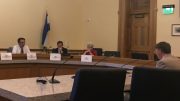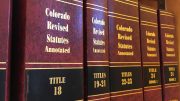By Jeffrey A. Roberts
CFOIC Executive Director
A legal move by the Jefferson County teachers’ union to block the release of names of teachers who collectively called in sick last fall incorrectly claims that information on absences is a private personnel matter, the Colorado Freedom of Information Coalition argued in a friend-of-the-court brief Friday.
The brief was submitted with the Colorado Press Association, the Colorado Broadcasters Association, The Denver Post and the Associated Press.
It contends that the Jeffco school district should be allowed to release the teachers’ names “because the public has a compelling interest in being able to monitor the performance (or, as here, non-performance) of public employees’ public functions and the expenditure of public funds.”
The Jefferson County Education Association (JCEA) was granted a preliminary injunction in February that temporarily bars the district from filling an open-records request for the names made earlier that month by Kathy Littlefield, a Golden parent of twin sixth-graders.
Littlefield asked for records showing which teachers at four Jeffco high schools called in sick or took personal leave over two days last September in an apparent protest against school board policies. Classes were canceled because so many teachers were absent.
A motion filed by the union in Jefferson County District Court asserts that teacher-absence files are personnel records and “medical information” that must be kept confidential under the Colorado Open Records Act (CORA). Releasing the names, the union claims, would violate the teachers’ privacy and “cause (them) irreparable injury.”
But the amicus brief submitted to the court by the CFOIC and media organizations notes that the Colorado Court of Appeals has narrowly defined the scope of personnel information that is exempt from public disclosure. The exemption is limited to “personal demographic information” of the same general nature as home addresses, telephone numbers or personal financial data. It doesn’t include “identifying only which public employees were absent from four public high schools on two particular dates and received public funds in compensation nonetheless.”
The brief also disputes the union’s contention that the teachers have a constitutionally protected “reasonable expectation of privacy” in records that merely show they were absent on a particular day.
Littlefield’s CORA request “does not seek to inspect any of the reasons given by these public employees for their taking sick leave,” the brief argues. Her request “made clear that she is interested to discover only which public employees…called in ‘sick’ on two particular dates and were therefore compensated from public funds for their excused absences from performing their public functions.”
The amicus brief notes that “numerous courts throughout the country have determined that disclosure of this exact information – the names of public employees and the days on which they received paid leave – does not constitute ‘highly personal and sensitive information,’ such that its disclosure would constitute an invasion of privacy.”
A hearing on the case is scheduled for May 15.
Follow the Colorado Freedom of Information Coalition on Twitter @CoFOIC. Like CFOIC’s Facebook page. Do you appreciate the information and resources provided by CFOIC? Please consider making a tax-deductible donation.




